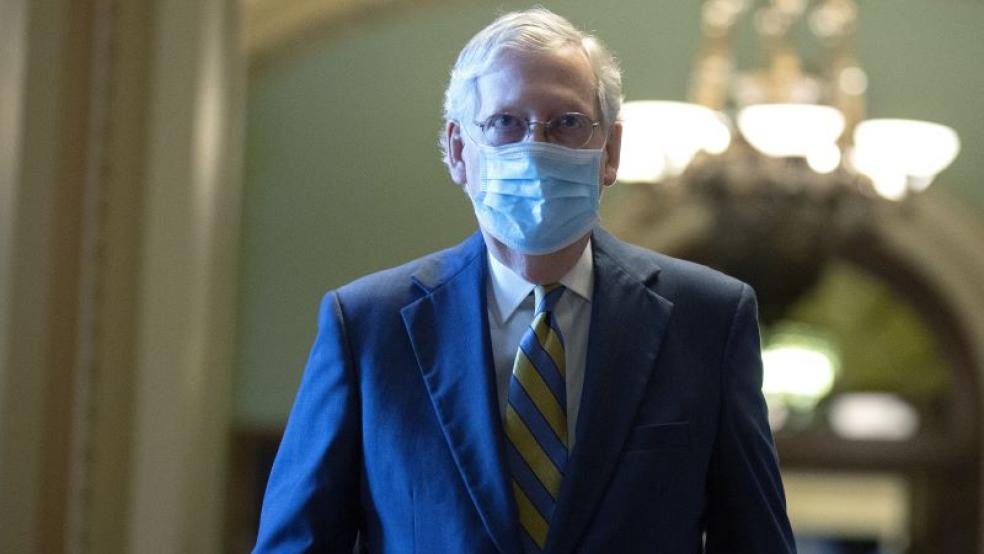House Speaker Nancy Pelosi (D-CA) said Tuesday that lawmakers are moving ahead with a draft of a new coronavirus stimulus bill, despite a lack of agreement on some key provisions.
Yet even as Pelosi insisted she and the Trump administration are “on a path” to a deal and that talks could continue beyond her self-imposed Tuesday deadline, Senate Majority Leader Mitch McConnell (R-KY) reportedly told fellow Republicans that he had warned the White House against agreeing to a deal before the election for fear of dividing his caucus and delaying the Supreme Court confirmation of Judge Amy Coney Barrett.
Inching ahead: After speaking with Treasury Secretary Stephen Mnuchin by telephone Tuesday afternoon, Pelosi said the two sides had continued to make progress, and she downplayed the Tuesday evening deadline for reaching a deal she herself had set last weekend.
“It isn’t that this day was a day that we would have a deal, it was a day that we would have our terms on the table to be able to go to the next step,” Pelosi said.
She told reporters that she hoped a deal could be reached by the end of the week.
Big issues remain: Pelosi said that while the White House team had “come a long way” toward accepting Democrats’ demands for more robust Covid-19 testing and tracing efforts in the legislation, two major issues continued to vex negotiators: liability protections for businesses that Republicans want and significant aid for state and local governments that Democrats want.
White House Chief of Staff Mark Meadows said the White House had upped its offer to $1.88 trillion, moving closer to the $2.2 trillion Democrats are seeking, though he also made it clear that there were still major hurdles to cross. “I want to stress: We’re not just down to a difference of language and a few dollars. We still have a ways to go,” Meadows said.
Trump lobbies again: In a morning interview with Fox News, President Trump reiterated his call for a substantial coronavirus relief bill. “It’s very simple. I want to do it even bigger than the Democrats," Trump said. “Now, not every Republican agrees with me, but they will. But I want to do it even bigger than the Democrats, because this is money going to people that did not deserve what happened to them coming out of China.”
Senate could stand in the way: Although House Democrats and the White House continue to push for a deal, all of their efforts could be for naught if the Republican-controlled Senate fails to support whatever agreement is reached.
McConnell said Tuesday that he would allow any deal to come up for a vote “at some point” — perhaps after the election — and only if Trump says he’ll sign it. “What I’m telling you is that if such a deal were to clear the House, obviously with the presidential signature promised, we would put it on the floor of the Senate and let the Senate consider it," McConnell told reporters, according to Politico.
But resistance among Republicans means it’s not clear a deal would pass the Senate.
- Senate Whip John Thune of South Dakota said that Republican’s “natural instinct, depending on how big it is, and what’s in it, is probably going to be to be against it.” He added, “I think we’re going to have a hard time finding 13 votes for anything,” referring to the number of Republicans that would be needed to vote with Democrats to pass a sizable relief bill. (Told about the senator’s comments, Trump said, “Well, we’ll have to talk to Sen. Thune.”)
- Sen. Mitt Romney of Utah: “I think it's very unlikely that a number of that level would make it through the Senate, and I don't support something of that level. Something far more targeted ... I'd like to see done and I'd like to see done as quick as possible.”
- Asked if Republican senators would support a $1.8 trillion relief bill, Sen. Josh Hawley of Missouri said, “If it includes blue state bailout money then I'd say that's probably a hard no. That's probably a red line for this caucus including for me.”
The negative outlook on the viability of a deal isn’t universal, however. Sen. Mike Braun (R-IN) said that while he would oppose it, there’s a chance a $2 trillion bill could actually get through the Senate.
“You’ll lose a lot of Republicans on whatever that is,” Braun said. “If they bring it up for a vote, I’m guessing there will be enough to get it across the finish line.”
The bottom line: A pre-election relief package still appears unlikely, especially given McConnell’s opposition and the limited time left. “McConnell’s stance could kill any chances for passing a new relief deal in the two weeks left before the election,” The Washington Post’s Jeff Stein and Erica Werner report.




